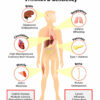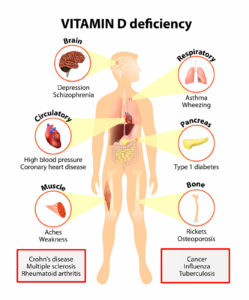
Vitamin Deficiencies and Vision Loss
No one wants to lose their vision, but unfortunately, sometimes people do and it is completely out of their control. But what if you were to lose your vision to something completely in your control, like a vitamin deficiency?
Vitamin deficiencies are 100 percent preventable, however, they are the leading cause of preventable blindness in developing countries. A vitamin A deficiency, in particular, can cause a lot of vision problems. But vitamin A isn’t the only nutrient your eyes need to be working and healthy.
Your eyes, like your body, need a multitude of nutrients and vitamins to prevent vision loss. If one is severely missing in the body, your eyes will bear the repercussions. Luckily, there are some really simple ways to get the vitamins and nutrients your eyes need.
Vitamin A Deficiency
A vitamin A deficiency is the hardest hit your eyes could possibly take. Vitamin A is absolutely essential to your vision health. It is THE eye vitamin. Without it, your eyes would be a total wreck. So, when someone has a vitamin A deficiency, it’s a safe bet that their vision will suffer immensely.
A vitamin A deficiency can lead to a vision condition called keratomalacia. Symptoms of this condition include night blindness, dry eyes (often extreme cases), blurred or clouded vision, and softening of the cornea. As the condition progresses, it can lead to gray deposits being formed on the whites (sclera) or the eye.
Without treatment, keratomalacia can lead to blindness caused by ruptures, corneal infections, or degenerative tissues.
Though rare in developed countries, vitamin A deficiencies do happen. They usually occur after weight-loss surgeries like gastric bypass. These types of surgeries affect the body’s ability to absorb nutrients. Post-surgery, patients are educated on which multivitamins to take and how to take them.
However, sometimes when this happens, a simple multivitamin will not be enough to counter the lack of vitamin A.
A vitamin A deficiency can also be a side effect of diseases such as celiac disease, liver disease, ulcerative colitis, and cystic fibrosis. But, no matter the cause of the deficiency, the result is the same. Your eyesight can’t survive.
Prevention
Preventing a vitamin A deficiency is easy to do, especially if you eat a whole lot of delicious and healthy foods! In developing countries, where a wide range of food is not available, vitamin A deficiencies are common among people of all ages, including infants. The World Health Organization has been working to bring healthy foods to developing countries to reduce the amount of vitamin A deficiencies.
Here in the US, we have no excuse when grocery stores are everywhere. The only thing that may prevent us from eating a healthy and rich in vitamin A diet, is price. We promise you don’t need to spend a lot to get all your vitamins. Besides, most vitamin A-rich foods are foods you probably would have purchased anyway!
Here are the top vitamin A-rich foods:
- Sweet potatoes
- Dark leafy greens
- Carrots
- Dried fruit (especially apricots)
- Butternut squash
- Fish (tuna, mackerel, oysters)
- Mango and papaya
These foods are all super versatile and easily incorporated into a home-cooked meal. The daily recommended amount of vitamin A is 3000 IU. When 21909 IU of vitamin A can be found in one medium sweet potato, you’ve almost had your entire daily recommended dose!
Don’t think that you need an excessive amount of food to get your vitamin A. The above options are just a few of the many great sources. If sweet potatoes aren’t your thing, a healthy amount of spinach or carrots will do the job just as well.
Vitamin B12 Deficiency
A vitamin A deficiency will directly impact your eyes, but several other vitamins may indirectly impact them. This is the case for a vitamin B12 deficiency. A lack of vitamin B12 will likely lead to anemia which in turn can cause vision loss among several other conditions.
Some symptoms of a B12 deficiency include; fatigue, shortness of breath, constipation, and loss of feeling or a tingling sensation in the extremities. If you exhibit any of these symptoms, your doctor will likely send you for a blood test.
Vitamin B12 is a difficult vitamin to get into your diet. It may sound odd, but many vegans have a B12 deficiency.
A few ways to treat the deficiency are to introduce vitamin B12 fortified grains into your diet (which is especially helpful to vegans), a B12 multivitamin or supplement, or in extreme cases, a vitamin B12 regular injection may be needed.
Vitamin D Deficiency
Recently, scientists have discovered a correlation between the sunshine vitamin and age-related macular degeneration. A vitamin D deficiency in older people with already declining vision has proven to worsen their conditions.

Everyone needs vitamin D and getting it is as easy as spending 10 minutes out in the sun. A vitamin D deficiency will not affect the eyes of a younger person, but once your eyesight begins to decline due to age, you’ll need all the help you can get. Exposing your eyes to a little bit of sunshine will help slow down the process of age-related macular degeneration.
You can also get your vitamin D from vitamin D supplements. You’re probably not going to want to go outside for even a second in the dead of winter. Supplements are a good alternative, and some supplements are even made to be stirred into your favorite drink.
If you’re having vision trouble, see your eye doctor immediately. If you’re suffering from a deficiency, you’ll need to take a blood test to confirm. Once confirmed you can talk to your doctor about how to restore your vision.
Follow these tips, eat right, and take your supplements (if needed). And, stay healthy, not only for your eyes but your overall well-being.
Our Rebuild Your Vision Ocu-Plus Formula Contains All 17 Vitamins, Minerals, and Herbal Supplements to Improve Your Eye Health!












I have a grandson who says that when he takes his new vitamins, (multi-vitamin plus a magnesium + calcium) he suddenly can see colors that looked gray before or even that his blurry eyesight clears up. What might be going on? Previously he didn’t know he had vision problems, because he was used to the way things were.
My neighbor is like the woman you mention who is unable to absorb vitamin a because of weight loss surgery. What did the woman you refer in your article do? Was she able to restore or slow the progression?
My eyes are extremely dry. Can pain medicine contribute?
Xerophthalmia a condition due to deficiency of Vitamin A where the conjunctiva and cornea become dry. You need to take 10,000 I.U daily of vitamin A for at least 3 months. This issue is curable, but in the same should not be ignored. I wish you a quick recovery.
I’m just 40 and recently found out I have retinal degeneration due to an issue of absorbing vit A. My levels are finally going up after a good year of testing and being in the danger zone. My question is, Can I correct the damage that has already been done?
Thanks
While vitamins are great for ocular health they do not change or correct your refractive error. I recommend vitamins to everyone. Note the title: improve vision health….. not improve your vision. Taking vitamins from a very early age though can slow disease processes especially Macular Degeneration.
What a piece for the vision challenged. Thanks for making is available
this is a great comprehensive article for us, the masses, something to refer back to , so glad to post on social media
Hi,
Thanks for this article. I have recently been doing eye sight exercises and making sure I am getting enough vitamins and minerals in my diet. I noticed that my eyesight is much better on certain days that I eat healthier food options and not so good on other days. I have astigmatism since age 16 and it has been more of a struggle in the last 3 years (I am 33 now) but I really find diet plays a direct role in how good I see.
Can your eyesight improve with healthy diet instead of using vitamin supplement
It should because the eyes will repair from the nutrients you get after while
Antioxidants will cure any eye fuzziness along with proper supplementing of the 92 vitamins 20 amino acids, however many minerals, and such needed for everyday health, I like Lutein, and Lycopene the best.